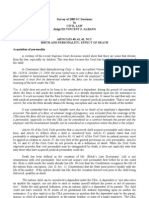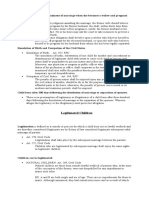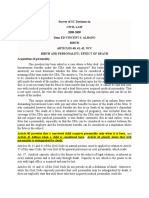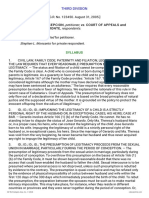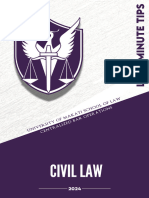0 ratings0% found this document useful (0 votes)
220 viewsInheritance Rights
Inheritance Rights
Uploaded by
Chinele Ramrattan1. The document discusses inheritance rights for children born out of wedlock in Commonwealth Caribbean jurisdictions.
2. At common law, children born out of wedlock had no rights of inheritance. The Status of Children legislation abolished legal discrimination, but vested rights existing prior to the legislation were preserved.
3. For intestacy, the rights of a child born out of wedlock depend on whether the parent died before or after the legislation commencement date, and if there were lawful next of kin. For wills, the statutory construction rule only applies to wills made after commencement; codicils may revive the common law rule.
Copyright:
© All Rights Reserved
Available Formats
Download as DOC, PDF, TXT or read online from Scribd
Inheritance Rights
Inheritance Rights
Uploaded by
Chinele Ramrattan0 ratings0% found this document useful (0 votes)
220 views3 pages1. The document discusses inheritance rights for children born out of wedlock in Commonwealth Caribbean jurisdictions.
2. At common law, children born out of wedlock had no rights of inheritance. The Status of Children legislation abolished legal discrimination, but vested rights existing prior to the legislation were preserved.
3. For intestacy, the rights of a child born out of wedlock depend on whether the parent died before or after the legislation commencement date, and if there were lawful next of kin. For wills, the statutory construction rule only applies to wills made after commencement; codicils may revive the common law rule.
Original Description:
Family Law as it pertains to the inheritance rights permitted in Trinidad and Tobago
Copyright
© © All Rights Reserved
Available Formats
DOC, PDF, TXT or read online from Scribd
Share this document
Did you find this document useful?
Is this content inappropriate?
1. The document discusses inheritance rights for children born out of wedlock in Commonwealth Caribbean jurisdictions.
2. At common law, children born out of wedlock had no rights of inheritance. The Status of Children legislation abolished legal discrimination, but vested rights existing prior to the legislation were preserved.
3. For intestacy, the rights of a child born out of wedlock depend on whether the parent died before or after the legislation commencement date, and if there were lawful next of kin. For wills, the statutory construction rule only applies to wills made after commencement; codicils may revive the common law rule.
Copyright:
© All Rights Reserved
Available Formats
Download as DOC, PDF, TXT or read online from Scribd
Download as doc, pdf, or txt
0 ratings0% found this document useful (0 votes)
220 views3 pagesInheritance Rights
Inheritance Rights
Uploaded by
Chinele Ramrattan1. The document discusses inheritance rights for children born out of wedlock in Commonwealth Caribbean jurisdictions.
2. At common law, children born out of wedlock had no rights of inheritance. The Status of Children legislation abolished legal discrimination, but vested rights existing prior to the legislation were preserved.
3. For intestacy, the rights of a child born out of wedlock depend on whether the parent died before or after the legislation commencement date, and if there were lawful next of kin. For wills, the statutory construction rule only applies to wills made after commencement; codicils may revive the common law rule.
Copyright:
© All Rights Reserved
Available Formats
Download as DOC, PDF, TXT or read online from Scribd
Download as doc, pdf, or txt
You are on page 1of 3
FAMILY LAW II
WORKSHEET 5(ii) – FINANCIAL SUPPORT AND PROPERTYRIGHTS
INHERITANCE RIGHTS - 2011-03-15
INTRODUCTION
The status of children legislation or its equivalent in almost every Commonwealth Caribbean jurisdiction has
abolished the legal discrimination against children born out of wedlock. The discrimination was no more glaring and
inequitable with regard to property and inheritance rights of such children both on testacy and intestacy.
1. LEGITIMATED CHILD
This is purely of intellectual interest and is not being lectured or focussed on.
2. CHILD BORN OUT OF WEDLOCK
A. Common Law Position:
(i) Intestacy
A child born out of wedlock had no rights of succession on the intestacy of the father parent and he had no
rights to succeed to the estate of a child.
(ii) Testacy
In the absence of evidence to the contrary, the rule of construction at common law is that any reference to a
child or children in a deed will or other testamentary instrument refers only to a child born in wedlock.
In Sydall v Castings [1967] 1 QB 302, a member of a group life insurance scheme died having a wife, children
and grandchildren of the marriage as well as an illegitimate daughter. The trustees of the group sought to
make a payment to this child, who was supported by the man prior to his death. The widow took out letters of
administration and sought a declaration that the illegitimate child was not in the class of beneficiaries. The
county court held that she was. In the Court of Appeal it was held that the illegitimate child did not qualify as
a descendant.
B. Pre-Status of Children Legislation
Pursuant to the respective legitimacy legislation, a child born out of wedlock, in respect of the mother, if she
died leaving no lawful next of kin, which means that she did not get married and had children from that union,
the child had rights of succession. So the child had rights against the mother’s estate and the mother had rights
against the child’s estate once that child did not leave a spouse and or children of a marriage.
That is how the law was prior to the Status of Children legislation.
C. Status of Children Legislation
(i) The Status of Children legislation of the respective Commonwealth Caribbean jurisdictions provide for
the removal of the distinction in the legal status of a child born out of wedlock. The Act is essentially the
same in most jurisdictions. In Barbados the Status of Children Reform Cap. 220 states: -
3. For the purposes of the laws of Barbados, the distinct at common law between the status of children born
within or outside of marriage is abolished, and all children shall, after 1st January, 1980, be of equal status; and
a person is the child of his or her natural parents and his or her status as their child is independent of whether the
child is born within or outside of marriage.
(ii) Scope of the Status of Children Legislation
While the respective legislation provides that it applies to persons born before or after the commencement
date of the Act, there are nonetheless limitations in respect of rights of inheritance in cases of testacy and
intestacy of the parent of a child born out of wedlock.
Intestacy
The rights of inheritance to the estate of a deceased parent is subject to vested rights – that is, rights
which have accrued prior to the commencement date of the Status of Children legislation.
There is some difference between the legislation in the various territories and those jurisdictions that
speak about vested rights are; Antigua & Barbuda, Grenada and Trinidad & Tobago. In those
jurisdictions, after it states about a child born out of wedlock having the same rights, whether born
before or after the commencement date of the legislation. It goes on to say at s.4 (1) ‘The Act does not
affect rights which became vested before its commencement.’
The case which explains the meaning of vested rights is Re Schuler’s Estate (1985) 37 WIR 371.
(Please note, the Status of Children Act of Trinidad & Tobago became operational in March 1983.) In
1
this case Suzanne was born out of wedlock to Andrew, who died intestate in 1982. He had never
married but was also survived by his lawful brother and sister (M and G). Suzanne argued that she
was entitled to her father’s estate since at the commencement date of the legislation, her father’s estate
had not yet been administered, in particular it had not been distributed to her father’s lawful next of
kin and as such they would suffer no prejudice and accordingly she was entitled to a share of her
father’s estate. Everything turned on the meaning of the word ‘vested’. Her argument was that
‘vested’ as used in the legislation meant vested in possession and used as support for her argument, a
case that was decided by Edoo J in 1984 – Re Pantin’s Estate (Unreported), in which case Edoo J
interpreted the word ‘vested’ to mean vested in possession. Because of that narrow interpretation,
since on the facts that on the date of the amendment to the legislation with respect to adopted children,
which amendment provided that an adopted child takes from the estate of his adoptive parents. The
legislation had been amended and since at the date when that had happened, the mother’s estate had
not been distributed, Edoo J took the view that the adopted child was also entitled equally as the
lawful natural children and the husband. The Court of Appeal concluded that Edoo J was wrong in
law and the term ‘subject to rights vested’ meant vested in interest and not in possession, and vested
in interest meant a present right to future possessions. Accordingly, the court held that when
Suzanne’s father died, in January 1982, the rights to his estate were vested in interest in M and J, who
were entitled to share the brother’s net estate, even though the estate was not as yet vested in
possession. The bottom line to all of that is that s. 4 (1) precludes any claim from a child born out of
wedlock, in relation to an intestacy, where death took place before the commencement date of the
legislation, except if there is no lawful next of kin, the child born out of wedlock would be entitled,
even though the intestate father died before the commencement date.
The difference is important because prior to the change in law, if there were no lawful next of kin, it
went to the State. Any child born out of wedlock would not be considered a next of kin, so that child
would not have a right to the estate; it went straight to the State. The difference between Antigua,
Grenada and Trinidad is that if there are no lawful next of kin in these jurisdictions, the child can get,
because it is subject to the rights that are vested; but in all other jurisdictions, the law is clear – the
rights of a child born out of wedlock, only become effective upon the commencement date of the
legislation, there are no rights before that date.
What is the position of the father?
In Antigua & Barbuda and Trinidad & Tobago, the legislation actually says that there is no
presumption that the child is survived by the father or paternal relatives, unless the contrary is shown,
but the father can apply even if the child has pre-deceased him.
In the Bahamas, Barbados and Grenada, where there is no statutory presumption, the father cannot
apply for a paternity order if the child pre-deceased him.
Where the presumption applies you can apply; however, in Grenada, the balance of proof is ‘beyond a
reasonable doubt’. In the Bahamas and Barbados it states that ‘the court must be satisfied’.
In Jamaica in the case of succession rights, if it is for the benefit of the father, paternity has to be
admitted during, or prior to the child’s birth. In other words if paternity was not acknowledged when
the child was alive, it cannot be done after the child’s death.
Testacy
In cases of testacy, while the common law rule of construction which provides that the words child or
children in a will does not refer to a child born out of wedlock, in the absence of a contrary intention
is abolished. The statutory rule of construction contained in the Status of Children legislation applies
only to wills made after the commencement date of the legislation.
If a will was made before the commencement date of the legislation, and words such as ‘my children
or issue’ were used and the testator died after the legislation date. Those words will have a statutory
rule of interpretation and include a child born out of wedlock, unless the contrary is shown. The issue
is where there is a codicil and there is a difference between Trinidad & Tobago and, Jamaica and
Antigua. It comes back to the same word vested. E.g., if there is a will that existed before the
commencement date and the words ‘my children’ were used, the legislation is passed in 1983 and in
1986 a codicil is made to the will and there is no mention of the children in the codicil. In Trinidad &
2
Tobago, Jamaica and Antigua & Barbuda, the legislation states that instead of applying the statutory
rule to the codicil, the common law rule is applied. Therefore unless a contrary intention is shown it
will not include a child born out of wedlock.
3. ADOPTED CHILD
A. The 1926 Adoption of Children Act
For the purposes of succession rights, the child of the adopter was deemed to remain the child of his
natural parents.
B. The 1949 Adoption of Children Legislation
Where after the date of adoption, the adopter or the adopted person or any other person dies intestate, the
real and personal property of such intestate shall devolve in all respects as if the adopted child were the
child of the adopter born in wedlock, and not the child of any other person.
C. Current Position
Intestacy
After an adoption order is made, the adopted child ceases to be a child of the biological parent.
Testacy
In the absence of a contrary intention in respect of an instrument made prior to the date of adoption,
or any reference expressed or implied to a child or children of the adopter shall include the adopted
child.
You might also like
- Demand Letter and Employment LetterDocument6 pagesDemand Letter and Employment LetterFarhana AnuarNo ratings yet
- ZMF-HRD-MRC (Medical Retainer Contract)Document2 pagesZMF-HRD-MRC (Medical Retainer Contract)Raymond Rogacion100% (2)
- Harvard Cover Letter SamplesDocument10 pagesHarvard Cover Letter Samplessdysangco100% (2)
- Adoption Law NigeriaDocument10 pagesAdoption Law Nigeriaasi basseyNo ratings yet
- 2015 Bar Exam Suggested Answers in Civil Law by The UP Law ComplexDocument9 pages2015 Bar Exam Suggested Answers in Civil Law by The UP Law ComplexLeonardo Egcatan100% (3)
- Employee-Employer Relationship Who Is An Employee?Document6 pagesEmployee-Employer Relationship Who Is An Employee?Johanne LariosaNo ratings yet
- 0 01 Memory Aid Persons and Family Relations 1.doc Version 1 2Document63 pages0 01 Memory Aid Persons and Family Relations 1.doc Version 1 2Naif Omar100% (1)
- People V Vera GR No. L-45685Document2 pagesPeople V Vera GR No. L-45685Adfat Pandan75% (4)
- Status of Chilidren EssayDocument3 pagesStatus of Chilidren EssayShameza DavidNo ratings yet
- Worksheet 3 (II)Document7 pagesWorksheet 3 (II)mn495bx47vNo ratings yet
- Worksheet 4Document19 pagesWorksheet 4mn495bx47vNo ratings yet
- Explain how the concept of shared parental responsibility functions in contemporary family structureDocument4 pagesExplain how the concept of shared parental responsibility functions in contemporary family structuresimonmikuroNo ratings yet
- 36.01 Santos Vs Republic 21 Scra 379Document4 pages36.01 Santos Vs Republic 21 Scra 379LalaLanibaNo ratings yet
- 2016 Pre-Week Bar Lecture in Ausl (Prof. Elmer T. Rabuya) Preliminary Title & Civil PersonalityDocument27 pages2016 Pre-Week Bar Lecture in Ausl (Prof. Elmer T. Rabuya) Preliminary Title & Civil PersonalitycarinokatrinaNo ratings yet
- Norma Del Socorro VDocument34 pagesNorma Del Socorro Vwenny capplemanNo ratings yet
- Read About The Inheritance Rights of Illegitimate ChildrenDocument4 pagesRead About The Inheritance Rights of Illegitimate ChildrenAdam Dhori'unNo ratings yet
- No. L-22523. September 29, 1967.Document5 pagesNo. L-22523. September 29, 1967.JnhNo ratings yet
- Legitimacy and Legitimation Conflict of LawsDocument21 pagesLegitimacy and Legitimation Conflict of LawsAyush Bansal100% (2)
- Parental Care and ResponsibilitiesDocument8 pagesParental Care and ResponsibilitiesabieromjNo ratings yet
- Legitimacy in Private International Law by Soumik Chakraborty 629Document17 pagesLegitimacy in Private International Law by Soumik Chakraborty 629Gokul RungtaNo ratings yet
- Hak Dan Kedudukan Anak Luar Nikah Yang Diakui Terhadap Warisan Tanah Ditinjau Dari Hukum Perdata Hijawati Dan RizayusmandaDocument12 pagesHak Dan Kedudukan Anak Luar Nikah Yang Diakui Terhadap Warisan Tanah Ditinjau Dari Hukum Perdata Hijawati Dan RizayusmandaXII2 ulfa indah sariNo ratings yet
- Adoption Case DigestDocument3 pagesAdoption Case DigestPamela ParceNo ratings yet
- Prasnik Vs RepublicDocument5 pagesPrasnik Vs RepublicJustin HarrisNo ratings yet
- Ms. Cony Clarino: JurisprudenceDocument3 pagesMs. Cony Clarino: Jurisprudencelen barcenasNo ratings yet
- RP - Illegitimate Child - Mark Kevin A. ArrocoDocument2 pagesRP - Illegitimate Child - Mark Kevin A. ArrocoMark Kevin ArrocoNo ratings yet
- Tirol.2011 2015.bar - QuestionsDocument167 pagesTirol.2011 2015.bar - QuestionsMark Jason S. TirolNo ratings yet
- Civil and Remedial Law-SurveyDocument68 pagesCivil and Remedial Law-SurveylawkoNo ratings yet
- Law 3220 - Worksheet 6Document11 pagesLaw 3220 - Worksheet 6mn495bx47vNo ratings yet
- Cases For Spec Pro FinalsDocument11 pagesCases For Spec Pro FinalsHazel Paguio-LastrolloNo ratings yet
- Private International Law. and Foreign Element Means A Contact With Some System of LawDocument16 pagesPrivate International Law. and Foreign Element Means A Contact With Some System of Lawshashi shekhar dixitNo ratings yet
- In Re: Petition For Adoption of Michelle P. Lim, Monina P. LimDocument24 pagesIn Re: Petition For Adoption of Michelle P. Lim, Monina P. LimmhadzNo ratings yet
- Legitimacy of Child and Adoption Unit 6Document8 pagesLegitimacy of Child and Adoption Unit 6Sudarshan GyawaliNo ratings yet
- 08-09 CivillawDocument32 pages08-09 Civillawcmv mendozaNo ratings yet
- Children Rights, Private Law Orders, Children Act 1989Document15 pagesChildren Rights, Private Law Orders, Children Act 1989Tiffany100% (2)
- Sayson Vs Sayson Adoption-Case-DigestsDocument3 pagesSayson Vs Sayson Adoption-Case-DigestsAlberto NicholsNo ratings yet
- For Q and A Re Retroactive Effect of Adoption LawsDocument4 pagesFor Q and A Re Retroactive Effect of Adoption LawsRomnick De los ReyesNo ratings yet
- Concecpion v. CA PDFDocument13 pagesConcecpion v. CA PDFAlsan IgnaligNo ratings yet
- Legal Medicine, Chapter 27 Vanne Olive AgnisDocument5 pagesLegal Medicine, Chapter 27 Vanne Olive AgnisVanne AgnisNo ratings yet
- Rights of Illegitimate ChildrenDocument11 pagesRights of Illegitimate ChildrenArchit BohraNo ratings yet
- ADOPTION Case DigestDocument3 pagesADOPTION Case DigestFruitie Sy0% (1)
- Family Law NotesDocument90 pagesFamily Law NotesOwor Kennedy100% (1)
- Last Minute Tips in CIVIL LAWDocument19 pagesLast Minute Tips in CIVIL LAWEdward Kenneth KungNo ratings yet
- Civil Law - Part 1 Dean Ed Vincent AlbanoDocument48 pagesCivil Law - Part 1 Dean Ed Vincent AlbanoStibun JureonNo ratings yet
- Family Law Assignment 2 DoneDocument9 pagesFamily Law Assignment 2 DoneevaristophiritanazyoNo ratings yet
- Lim Vs LimDocument7 pagesLim Vs LimstudyNo ratings yet
- Civil Law Review 1final ExamDocument11 pagesCivil Law Review 1final ExamRenzy CapadosaNo ratings yet
- Illegitimacy and Succession Under Private International Law 2Document22 pagesIllegitimacy and Succession Under Private International Law 2pradeep punuruNo ratings yet
- Bagtas Vs SantosDocument3 pagesBagtas Vs SantosJohn Garcia100% (1)
- FamilyLaw Adoption Issues RHAliDocument9 pagesFamilyLaw Adoption Issues RHAlilovscenesNo ratings yet
- In Re Lim UcolDocument2 pagesIn Re Lim UcolAntonio BartolomeNo ratings yet
- Facts: Nhiwatiwa V Nhiwatiwa & 2 Ors (HH 420 of 2020, HC 8557 of 2018) (2020) ZWHHC 420 (25 June 2020Document5 pagesFacts: Nhiwatiwa V Nhiwatiwa & 2 Ors (HH 420 of 2020, HC 8557 of 2018) (2020) ZWHHC 420 (25 June 2020Colias DubeNo ratings yet
- Suggested AnswersDocument8 pagesSuggested AnswersJordine UmayamNo ratings yet
- PFR CompiledDocument91 pagesPFR CompiledLyn Dela Cruz DumoNo ratings yet
- Rights of Legitimate - Legitimated - Illegitimate ChildrenDocument10 pagesRights of Legitimate - Legitimated - Illegitimate ChildrenCora NovusNo ratings yet
- (Digest) in Re Adoption of Edwin VillaDocument2 pages(Digest) in Re Adoption of Edwin VillaKarla Bee100% (2)
- Petitioner Vs Vs Respondents Juan Orendain P. Buted Stephen L. MonsantoDocument12 pagesPetitioner Vs Vs Respondents Juan Orendain P. Buted Stephen L. MonsantoLucio GeorgioNo ratings yet
- In Re Petition For Adoption of Michelle LimDocument4 pagesIn Re Petition For Adoption of Michelle LimtimothymaderazoNo ratings yet
- Lahom vs. Sibulo G.R. No. 143989 July 14, 2003Document9 pagesLahom vs. Sibulo G.R. No. 143989 July 14, 2003Robert MantoNo ratings yet
- Civil Law Last Minute TipsDocument22 pagesCivil Law Last Minute TipsClarinda MunozNo ratings yet
- Legitimes UribeDocument23 pagesLegitimes UribeAnn HopeloveNo ratings yet
- Legitimacy Under Private International LawDocument8 pagesLegitimacy Under Private International LawVidhi Aggarwal 38No ratings yet
- 3nd Exam Conflicts FinalDocument13 pages3nd Exam Conflicts FinalPearl Angeli Quisido CanadaNo ratings yet
- Shivangi Health Law Final DraftDocument7 pagesShivangi Health Law Final DraftAanchal KashyapNo ratings yet
- Wills Law and Contests: Writing a Valid Will, Trust Administration, and Trust Fiduciary DutyFrom EverandWills Law and Contests: Writing a Valid Will, Trust Administration, and Trust Fiduciary DutyRating: 2 out of 5 stars2/5 (1)
- Love Thy Neighbor, Barangay Legal Aid Free Information GuideFrom EverandLove Thy Neighbor, Barangay Legal Aid Free Information GuideNo ratings yet
- International Association of Korean Lawyers: Detailed Seminar ProgramDocument6 pagesInternational Association of Korean Lawyers: Detailed Seminar Programnapaba_mnNo ratings yet
- Griño Vs ComelecDocument2 pagesGriño Vs ComelecAliw del RosarioNo ratings yet
- 2010 STPL (Web) 406 SC Supreme Court of India: (Dr. B.S. Chauhan & Swatanter Kumar, JJ.)Document6 pages2010 STPL (Web) 406 SC Supreme Court of India: (Dr. B.S. Chauhan & Swatanter Kumar, JJ.)Vritant DuaNo ratings yet
- Magalona Vs ErmitaDocument12 pagesMagalona Vs ErmitaJay SuarezNo ratings yet
- Usca All Multi-Circuit Original Proceedings NBCP-NC 2016 Cinc Potus Updated 12-2-2015Document20 pagesUsca All Multi-Circuit Original Proceedings NBCP-NC 2016 Cinc Potus Updated 12-2-2015Anonymous ul8QHgHl5XNo ratings yet
- Ruehle's Renewed Motion To DismissDocument31 pagesRuehle's Renewed Motion To DismissTom KirkendallNo ratings yet
- Important Themes of Indian ConstitutionDocument59 pagesImportant Themes of Indian ConstitutionKunal BazalaNo ratings yet
- Chapter 10 Solman Aud TheoDocument8 pagesChapter 10 Solman Aud TheoRomulus AronNo ratings yet
- Ipr PresenataionDocument9 pagesIpr PresenataionAmitKumar100% (1)
- Supreme Court: Melencio-Herrera, J.Document6 pagesSupreme Court: Melencio-Herrera, J.Ada Bonita TohayNo ratings yet
- Asistio v. Aguirre (G.r. No. 191124 April 27, 2010)Document3 pagesAsistio v. Aguirre (G.r. No. 191124 April 27, 2010)Jennylyn Favila MagdadaroNo ratings yet
- Contract of LeaseDocument2 pagesContract of LeasejanetteNo ratings yet
- Socio Final ProjectDocument18 pagesSocio Final ProjectAishani ChakrabortyNo ratings yet
- Chapter 1 (CIVICS) : DemocracyDocument90 pagesChapter 1 (CIVICS) : DemocracyGeeta BhattNo ratings yet
- United States v. John Dioguardi, A/K/A Johnny Dio, Thomas Plumeri, David Perlman and Firstnational Kosher Provisions, Inc., 428 F.2d 1033, 1st Cir. (1970)Document10 pagesUnited States v. John Dioguardi, A/K/A Johnny Dio, Thomas Plumeri, David Perlman and Firstnational Kosher Provisions, Inc., 428 F.2d 1033, 1st Cir. (1970)Scribd Government DocsNo ratings yet
- Page2Document1 pagePage2The Myanmar TimesNo ratings yet
- People Vs GenosaDocument20 pagesPeople Vs GenosaYordi PastulioNo ratings yet
- Complete-Forms OJTDocument20 pagesComplete-Forms OJTChristopher YsitNo ratings yet
- ASL Topics For Class IX C & X A & BDocument5 pagesASL Topics For Class IX C & X A & BsbvmchoNo ratings yet
- Roxas Vs de Jesus Case DigestDocument2 pagesRoxas Vs de Jesus Case DigestJohn Leo Solinap100% (2)
- Partnership 2Document64 pagesPartnership 2Anis AlwaniNo ratings yet
- Who Killed Ira TobolowskyDocument27 pagesWho Killed Ira TobolowskySteve AubreyNo ratings yet
- Vda. de Alberto Vs Court of AppealsDocument5 pagesVda. de Alberto Vs Court of AppealsraltizoNo ratings yet
- SERGIO - 92 RODRIGUEZ vs. SANDIGANBAYANDocument2 pagesSERGIO - 92 RODRIGUEZ vs. SANDIGANBAYANobladi obladaNo ratings yet


























